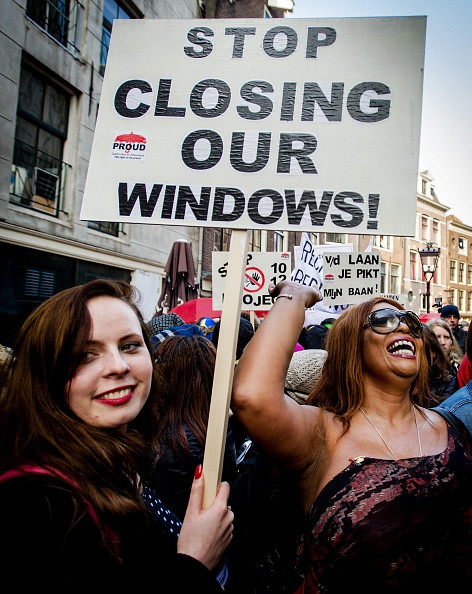Inna Shevchenko: Legalising the sex trade will only make pimps and criminals richer

On 7 August, Amnesty International delegates from 80 countries gathered in Dublin for a three- day meeting on a new pro-prostitution policy that could see them call for the decriminalisation of the sex trade.
If the vote is successful, which it is expected to be, it will mark the first step towards a lobbying campaign that will see the human rights organisation push for legalisation with governments across the world.
Many of you may not see any issue with that. Indeed, many believe that by calling for prostitution to be legalised they are dignifying, protecting and professionalising the women involved.
But making prostitution a trade does not dignify women, it simply dignifies the sex industry. Let's not forget that decriminalisation means legalisation of the entire sex industry, not just prostitutes. Many haven't thought about the consequences of making pimps legitimate business owners, but decriminalisation makes life easier for both pimps and clients, not for prostitutes.
A person paying for sex is simply paying for a "yes". He is buying a woman who only enjoys it if he wants her to, when he wants her to, and in the way he wants and has paid and ordered her to
Yes, legalisation means that prostitutes will not be arrested and will not be considered criminals, but the same applies to traffickers, pimps and brothel owners. It also guarantees impunity for those who pay for sex, the clients.
Amnesty International argues that prostitution – or "sex work", as the group calls it – is a "contractual arrangement where sexual services are negotiated between consenting adults, with the terms of engagement agreed between the seller and the buyer of sexual services".
But this statement hides the reality of prostitution and replaces it with an amateurish and romanticised vision of the sex industry. Not only have I worked on this issue for six years with [Ukrainian activists] Femen, but I come from Ukraine, a country with a high level of prostitution. As a result, I am telling you that prostitution is nothing more than male domination in its purest form.
The act of prostitution is not an equal sex act. It puts the woman in a subordinate position, reducing her to an instrument of sexual pleasure for a client who pays money. Indeed, the act of prostitution by definition joins together two forms of social power: sex and money.
In both realms men hold substantial and systematic power over women. It is ridiculous to claim that prostitution is a job for independent and successful women. Even if there are some women who claim that they do it by choice, it is proven that the vast majority involved in the sex trade are forced into it by economic insecurity and are often either victims of trafficking or illegal immigrants.
It is women from eastern Europe, Africa and Asia that are most often forced into prostitution as they come from poor and unstable countries, only a very small number of women from central Europe are working in the sex-industry.
Amnesty International argues that "sexual desire and activity is an important human right" for men to improve their "life enjoyment and dignity". French anti-sex trade organisation Mouvement du Nid (Movement of the Nest) retorts: "Sex buyers are men who exploit the precariousness and vulnerabilities of prostituted persons to impose sexual intercourse with their money."
It adds: "Rape, sexual harassment, incest and prostitution are driven by the very same logic which makes women and girls' bodies available for the so called 'irrepressible sexual needs of men."
While Amnesty International surprisingly recognises sexual freedom, that is indeed an important human right, only for men, we should not forget that the sex-industry consists of constant violence, discrimination and economic domination and that therefore it can simply not guarantee sexual freedom for women, in fact, it denies it.

A person paying for sex is simply paying for a "yes". He is buying a woman who only enjoys it if he wants her to, when he wants her to, and in the way he wants and has paid and ordered her to.
Amnesty International's argument that legalisation would regulate the expansion of prostitution is also a brutal lie. The examples of Germany, Netherlands and the State of Victoria in Australia, show that legalisation has led to a massive expansion of the sex industry.
Legalization increases the demand for prostitution. It boosts the motivation of men to buy women for sex in a much wider and more permissible range of socially acceptable settings.
With the advent of legalization in countries that have decriminalized the sex industry, many men who would not have risked buying women for sex now see prostitution as acceptable. When legal barriers disappear, so do the social and ethical barriers to treating women as sexual commodities.
As a result of proposing this policy, Amnesty International has been severely hit by critics from within the organisation, with some members and even entire branches declaring their disagreement and Hollywood stars such as Meryl Streep, Kate Winslet and others writing an open letter opposing the initiative.
Many feminists and humanists have joined the opposition to Amnesty International's new policy, as we feel betrayed and humiliated by such a blatant attempt to support patriarchy instead of fighting it.
And yet, there are ways to tackle the issue of prostitution that don't involve either decriminalisation or criminalising the women that work in the sex trade. One was put forward by renowned women's rights campaigner Gloria Steiner, who said: "Legalisation keeps pimps, brothel keepers, and sex-slavers in freedom and riches. Criminalisation puts the prostitute in prison,"
"What works is the Nordic model, which offers services and alternatives to prostituted people, and fines buyers and educates them to the realities of the global sex trade."
By criminalizing clients and pimps without any legal charges for prostitutes themselves we will hit the business and its owners and repel potential clients while at the same time protecting women.
The argument I am making is not a new one, in fact the discussion of the abolition of prostitution dates back to the anti-slavery campaigns of the 19th century. Humanists such as Victor Hugo, Jean Jaurès and Victor Schœlcher promoted the idea of fighting prostitution as a form of slavery.
We oppose the new policy of Amnesty International and stand for the criminalisation of clients of prostitutes because prostitution is not the world's oldest profession, but the world's oldest form of oppression.
So why would an international human right organisation oppose it? Isn't it incomprehensible? Why doesn't Amnesty International remain devoted to its fundamental ideas?
I suppose the answer doesn't really matter. What matters is the impact that its stance will have on a generation of boys who will grow up with the idea that they can buy a woman as a commodity and a generation of girls that will grow up with the option of becoming prostitutes.
We oppose the new policy of Amnesty International and stand for the criminalisation of clients of prostitutes because prostitution is not the world's oldest profession, but the world's oldest form of oppression.
© Copyright IBTimes 2025. All rights reserved.






















